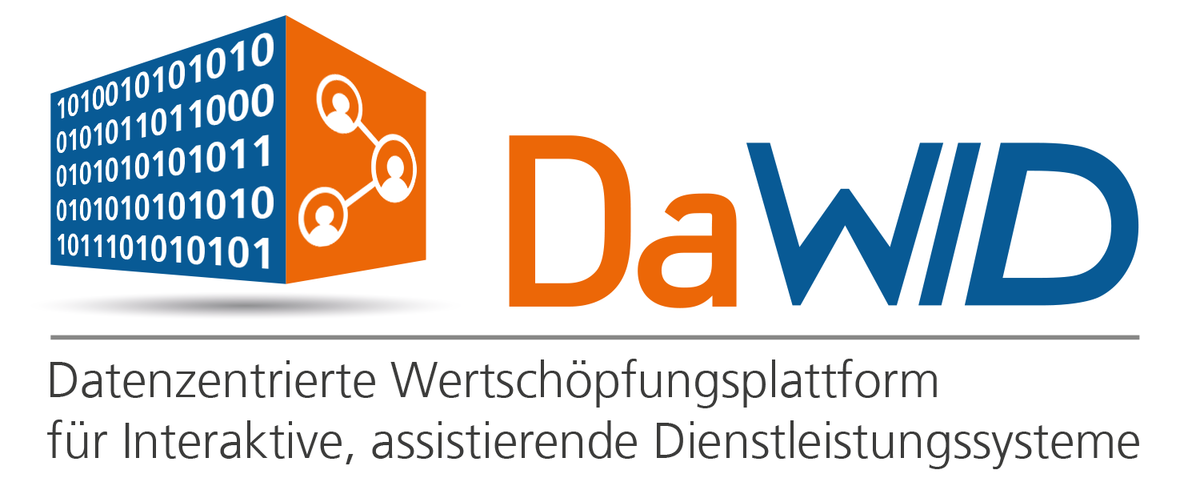
DaWID: Data-Centered Value Creation
- Contact:
Ali Sunyaev
- Project Group:
Ali Sunyaev, Tobias Dehling, Jan Bartsch
- Funding:
Bundesministerium für Bildung und Forschung (BMBF)
- Startdate:
01.02.2020
- Enddate:
31.01.2023
Motivation:
Information is a fundamental component of services, platforms, and new business models within today’s IT landscape. Such information usually originates from the processing and refinement of the data of the citizens, who share it in an active manner or provide it as a result of a measurement (e.g. via IoT devices). Consequently, digital service providers collect data on a large scale. Individual citizens can easily lose track of their data in terms of storage location and in terms of usage and distribution of the data or the information derived from their data. In this scenario the risk occurs that citizens are no longer the sovereign over their own data.
Goals:
The DaWID project aims to create a metaplatform that, on the one hand, offers citizens the opportunity to ensure their data sovereignty, and on the other hand, creates cross-platform mechanisms to link previously encapsulated services and platforms. This allows data-driven value chains to be created: Data is collected and refined by an orchestrated sequence of services along the chain and brought into a common context. Due to this, the value of the derived information is enhanced by every further step along the chain. The resulting data product is made available to the initial customer and / or potentially further customers. DaWID will provide enhanced monetization capabilities related to data for citizens and companies while the processing and provision of the data follows the requirements of the respective individual.
Background:
The DaWID project will overcome two fundamental challenges:
First, sovereignty over data use, data access, and data provenance will be established for citizens. Currently, citizens' own data, and the corresponding information, is not stored with them. Instead, it is distributed across diverse platforms. For now, a good solution to trace and control the provenance, usage, and forwarding of data is not available.
The currently independently acting platforms need to be interconnected to form a united ecosystem. Then it will be possible to offer services along a data-driven value chain. Currently, we are considering C-to-B-to-B(-to-C) models. Economic impact factors of such a metaplatform need to be examined. Since the data of the individual are the fundamental good of the value chain, procedures for value determination are necessary in order to give the citizens a feeling for the value of their data.
Due to the deep and increasing entanglement of digital platforms and smart devices with everyone's life and the increasing use of data and data processing in digital business models, an analysis of the ethical implications is necessary. For this reason, ethical, social, and legal questions about data-using and data-processing business models are examined in the context of DaWID.
DaWID is carried out by a consortium of industry and research organizations. The consortium consists of the Fraunhofer Institute for Software and Systems Engineering (ISST, Dortmund) acting as coordinator, the Institute for Digital Transformation in Healthcare (idigiT, Witten), the Fraunhofer Center for International Management and Knowledge Economy (IMW, Leipzig), T-Systems International GmbH - IoT Data Analytics (Berlin), and the Karlsruher Institute for Technology (KIT, Karlsruhe) represented by the Critical Information Infrastructures (cii) research group at the Institute of Applied Informatics and Formal Description Methods (AIFB) under the direction of Prof. Dr. Ail Sunyaev.
In the course of the project the cii group will provide methods to describe and to technically realize data processing chains. Mechanism to establish the citizens’ data sovereignty will be investigated. Therefore, citizens’ need to be enabled to trace and influence the flow of their data/information across the involved platforms. The citizens’ intentions regarding their data usage needs to be stated in a machine-readable manner, matched with the related data, and enforced across all platforms. It is also necessary to understand possible information flows across the platforms and to secure the storage and transfer of the data. Archiving those goals while simultaneously allow smooth data usage across multiple services is a challenge.
An overview of established data processing chains and their aspects will be given. To test the suitableness of previously identified and existing methods for capturing data processing chains a rating scheme will be constructed and applied. Such methods have to be capable to examine the data processing chain from the collection, through the preparation, to the usage of the data.
As a result, a data processing chain suited for the DaWID project will be created, implemented, and improved iteratively.
To utilize existing platforms like the Industrial Data Space and the Data Intelligence Hub most efficiently, the cii group will work particularly close with Fraunhofer ISST and T-Systems.
DaWID is funded by the Federal Ministry of Education and Research (BMBF) and VDI/VDE Innovation + Technik Gmb as project executing organisation.
DaWID will run from February 2020 to January 2023.
Further Information:
For further information about the DaWID project, please refer to https://www.dawid-projekt.de/.
